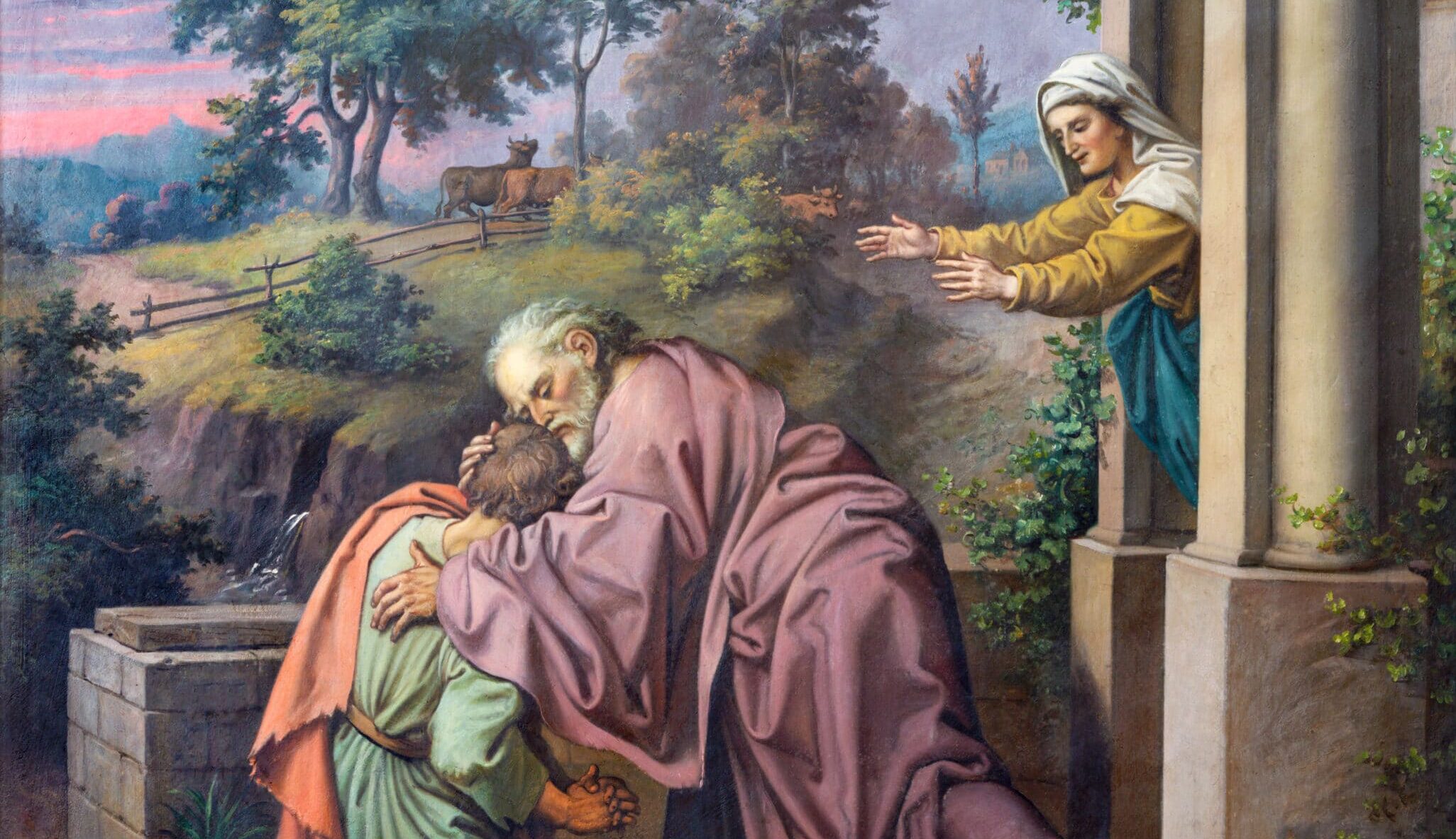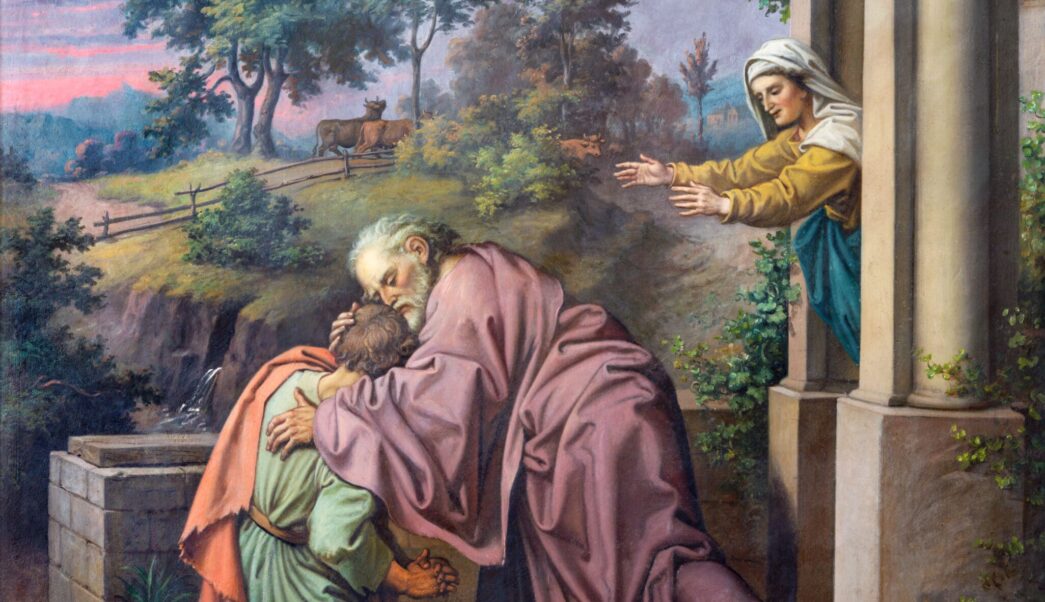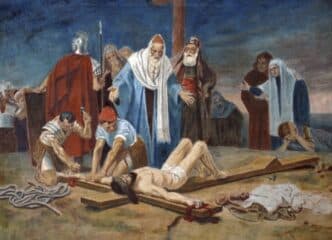Lent, like Advent, marks a period of penitential preparation for the celebration of a glorious feast. The penance is necessary insofar as almost none of us are truly ready for such a celebration in our current, sinful condition. Each of us has allowed our love for God and our joy in the sacrifice and resurrection of his beloved Son to become clouded over with the infamous “cares of the world,” and the tendency to allow our gaze to sink to the gifts of God and forget about the giver of those gifts.
Indeed, our tendency is to wallow in temporal goods, trying to find our happiness there instead of in the one place that it can actually be found. If our hearts are restless until they rest in God, as St. Augustine said, we are far too prone to try to assuage that restlessness in the multiplication of finite goods, pleasures and distractions.
It is all of this which makes penance necessary. To quote Augustine again, “God would like to give us himself, but our hands are full.” So Lent is a time to empty our hands in order to make room for God’s self-gift.
We have to be careful, however, not to make this a matter of our own efforts. This is a trap I often find myself falling into during Lent: first, trying really hard to make the requisite sacrifices while ratcheting up my prayer life and works of mercy; then, feeling really bad about how inadequate my actual actions are compared to my pre-Lenten intentions. A good rereading of the parable of the prodigal son can be helpful in this regard.
A parable about our relationship with God
In his book “Catholicism,” Bishop Robert Barron makes the interesting observation that both of the sons in the tale have misunderstood their father and their relationship with him. Remember the centrality of covenant in the Biblical narrative, and, particularly, the covenant of kinship — God wishes to extend a familial bond, first to Israel, but then, through Israel, to all the nations. In fact, it is the question of this extension of the covenant beyond the boundaries of Israel which provides the controversial context of the parable in question.
At the beginning of Luke 15, we are told that Jesus is eating with tax collectors and sinners and that the Pharisees and scribes are “grumbling” about this. This is the oft-ignored context within which Jesus tells the next three parables, each with a strikingly similar message. First he tells the parable of the lost coin, then the parable of the lost sheep; the series culminates with the parable of the prodigal son, a climax achieved precisely by the use of familial language. Note that Luke’s Gospel is intent upon showing that the extension of the apostles’ preaching to the Gentiles has a basis in the life and teachings of Jesus, even if Jesus didn’t exactly make that move himself.
In the light of this, we get a better sense of whom each of the main characters in the parable represents: The father represents God, the younger son represents the sinners and tax collectors, and the older son represents the Pharisees and scribes. Notice that the older son accuses the younger son of blowing his inheritance on prostitutes, i.e., of mixing with sinners (Lk 15:30).
God wants children, not slaves
Reading the parable during Lent, however, brings to light something that may be otherwise missed. To return to Bishop Barron’s reading, neither of the sons in the parable sees his relationship with his father in terms of familial love, but, rather, in terms of contractual obligations and rewards. This is obvious in the case of the younger son. He has come to see his current situation as a burdensome obstacle to his individual freedom and is ready to put some “distance” (15:13) between him and his father’s house. There are strong echoes, here, of Adam and Eve hiding in the Garden of Eden.
This desire for distance and the experience of his father’s house as a burden are not, however, unique to the younger, unfaithful son; they are strangely present also in the older, allegedly faithful one. As Bishop Barron points out, not only is the older son way out in the fields when his younger brother comes home, when he describes his own fidelity to his father, he puts it in less-than-enthusiastic terms: “For all of these years I have been working like a slave for you, and I have never disobeyed your command; yet you have never given me a young goat so that I might celebrate with my friends” (15:29).
Such phrases! “Working like a slave,” “never disobeyed your command,” “you have never given me… .” It’s not hard to detect that the older brother’s experience of his father’s house was strikingly similar to his brother’s, and one begins to wonder if he only stuck around for the earthly reward that he would eventually get for his years of “slavery.” Does he really “work like a slave”? Can he really claim to have “never” disobeyed a command? And, finally, what has he been eating all these years if his father has “never given [him] even a young goat”? To refer once more to the Garden of Eden, it is a trick of the devil to exaggerate the burdens that God puts on us: “Did God say, ‘You shall not eat from any tree in the garden?'” (Gn 3:1). In spite of the more obvious “dissolute living” of the younger son, we have every reason to expect that it is the older son who is in the graver danger.
Slowly coming to our senses
It is not until the younger son tries to find happiness on his own terms — and at a great “distance” from his father — that he comes to realize how generous his father had been to him all of those years. Suddenly, what once seemed a tiresome burden becomes a longed-for sanctuary: “But when he came to himself he said, ‘How many of my father’s hired hands have bread enough and to spare, but here I am dying of hunger'” (15:17). It is precisely when “he came to himself,” that is, that he began to see things as they actually were, rather than through the jaundiced lens of his former ingratitude.
But even here he is not fully aware of the reality of the situation, for he still seems to be thinking in contractual terms. The speech he works out in advance betrays this contractual logic: He will return as a “hired hand” because he has already given up his right to be a son. Notice that even though he realizes that his life with his father was better than he once thought, he still radically misunderstands the nature of the relationship. He still sees it in legalistic terms and fully expects his father to treat him out of mere justice.
It is only when he actually returns and witnesses the extent of his father’s unconditional love that he is prepared for the feast to come. If we were to borrow from Augustine’s terminology, we could say that the son’s coming to his senses in the pigpen was the work of prevenient (preparatory) grace, whereas the father’s loving reaction to his son’s return was an act of justifying grace.
The parable of the prodigal father
Let us turn our attention, then, to the father and recall a previous point regarding the serpent in the garden. The serpent misquotes God as having said that Adam and Eve could not eat from any tree in the garden, thereby turning the generous God of creation into a parsimonious and stingy god of our own imagination. Rather than being grateful for all the trees that God had given them to eat from, the serpent tricks Adam and Eve into fixating on the one tree that they couldn’t. Rather than our two sons recognizing all the wonderful gifts that their father had given them on his estate, they seem to see their lives as drudgery. And yet there is no indication from the parable that the father is like this. I’ve often thought that if I were the father in the story, I would have told the younger son that he was free to run off to the city if he wanted to, but he certainly wouldn’t be getting his inheritance! But not this father. I once heard a priest say that the parable should be called the parable of the prodigal father.
From the father’s perspective, the relationship with his sons was never one of command and obedience or tit for tat. From the father’s perspective, it had always been a relationship of gratuitous love. This may, on the surface, sound trite, as we’ve heard it so many times. I suspect that the prodigal son had even heard his father tell him that he loved him, as I’m sure the older son had as well. But, to borrow a distinction from St. John Henry Newman, notional assent is one thing, and real assent is another.
When the younger son returns home, however, he sees firsthand — and perhaps for the first time is able to see — the extent and nature of his father’s love. He doesn’t even have time to get out his planned speech about returning as a hired hand because the father is too busy preemptively showering him with love. He runs out to greet him! He makes preparations for a celebration! For his son was dead, and is now alive! Now, on the one hand, this may seem all rather run-of-the-mill. What father wouldn’t be glad over the return of a wayward son? In other words, Jesus isn’t telling us anything we don’t already know about the way parents love their children. What is striking is that he is telling us that the omnipotent, eternal Creator of the world is also a father. This is what ought to shock us, what ought to elicit our love.
Experiencing the beauty of unconditional love
St. John tells us that it is not we who first loved God, but God who first loved us (1 Jn 4:10). However, we have the same tendency of the sons in the parable to understand our relationship with God in legalistic, obligatory terms. That’s because in our fallen condition, the Ten Commandments remain written on tablets of stone; they are external and therefore burdensome. We may disobey them, like the younger son, we may obey them, like the older son, but in either case they remain a burden to be endured. And we can never be in a position to feast with our Father as long as this is the case. What is there to celebrate about slaving away in our father’s fields?
It took the younger son’s bottoming out, so to speak, in order for him to see that his father wasn’t a tight-fisted taskmaster after all. But it also took more than that. It took an existential experience of the beauty of his father’s unconditional love to awaken a similar love in him. Beauty, the appearance of love, has just this capacity to awaken the love (eros) that lies dormant in us all. This should remind us of another passage in Luke’s Gospel: “Therefore, I tell you, her sins, which were many, have been forgiven; hence she has shown great love. But the one to whom little is forgiven, loves little” (7:47). Because the older brother is under the impression that he is sinless (“never disobeyed your command”), he is never ready for the feast; he remains at a distance.
But let’s return to the younger son, for in him we see combined both verses quoted above: John (God’s love for us makes our love of God possible) and Luke (he who has been forgiven much, loves much). The father’s forgiving love for the sinful son creates the conditions of possibility for the son to love the father in return. We could even say that the law of love has now been written on his heart. Even the moment he “came to himself” in the pigpen only occurred because he remembered that his father was loving. The father’s love is what makes possible the son’s return, and the father’s additional, forgiving love when the son does return is what makes him ready for the feast. The father’s love is life-giving and gratuitous all the way down.
Lent prepares us to receive God’s love
In order to be ready for the feast of Easter, we, too, need to empty ourselves, to voluntarily “bottom out,” so to speak, so that we are in a position to receive God’s love. After all, it’s not while the prodigal son was wining and dining that he “remembers his father’s house.” It’s when he no longer has any of the gods of his own making that “he comes to himself.” But the bottoming out is not an end in itself; it simply provides the occasion to remember that God loves us, rather than simply commands us, even if love does make demands.
In other words, it’s when we recall that all of this penance, repentance and fasting are made possible by and in service of God’s love, that we can avoid the tendency to distance ourselves from God, like Adam and Eve did, out of shame. Perhaps we’ve even, like the younger son, planned a little speech to the effect that we will return to God, only now as hired hands, if he’ll only spare us being cut off from his rewards. But I think we’ll find that when we do “come to ourselves” and return to God, we’ll barely get “I’m not worthy to be your son” out of our mouths before he’s killing the fatted calf, or, in this case, sacrificing his only begotten Son. “While we still were sinners, Christ died for us” (Rom 5:8).
Lent, then, is a time of emptying our hands, acknowledging our sins, and recalling our Father’s love so that when Easter rolls around each of us can hear once more, “this brother of yours was dead and has come to life; he was lost and has been found.” And then we can feast, for Jesus has always been willing to dine with tax collectors and sinners who have been forgiven much and, thereby, made able to love much.








